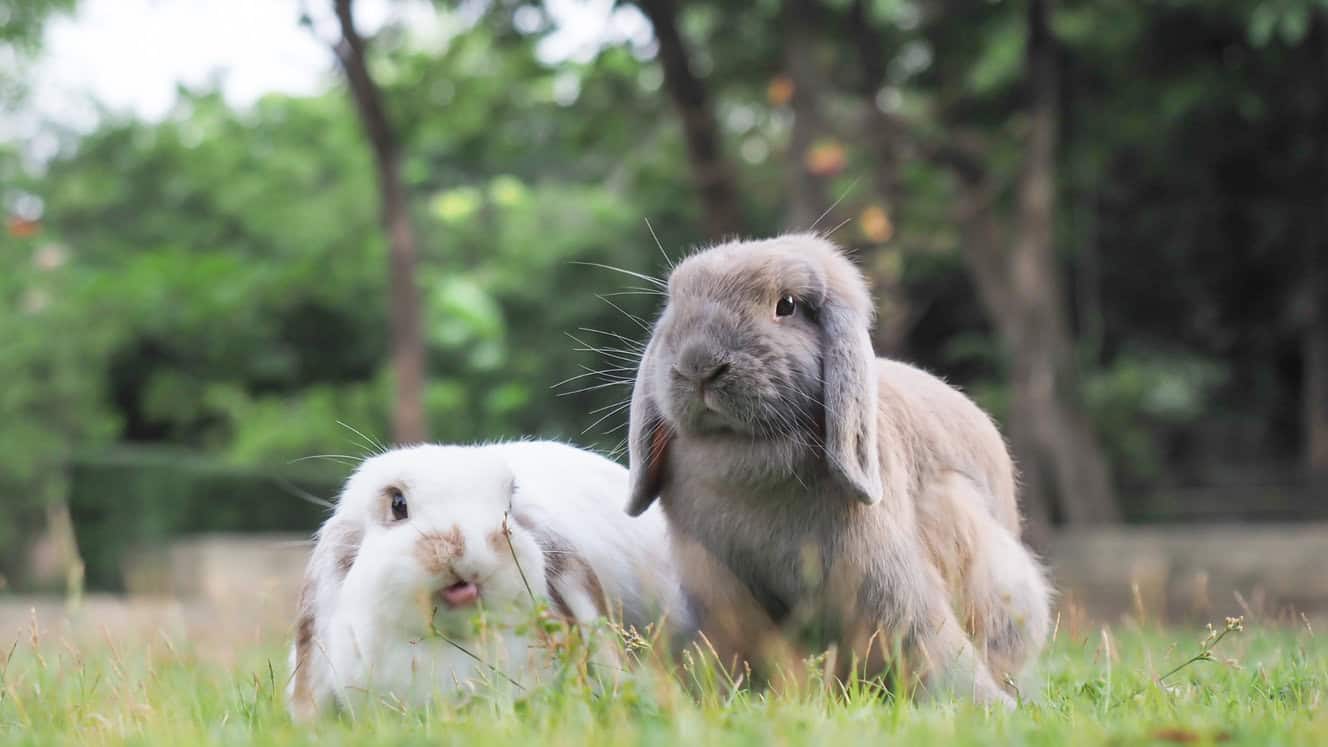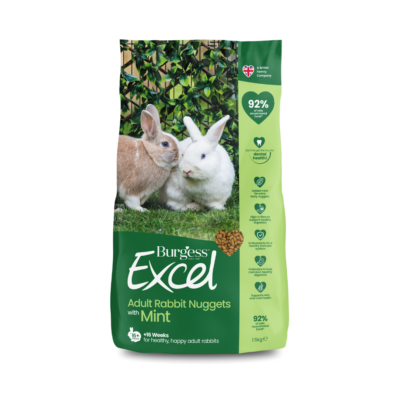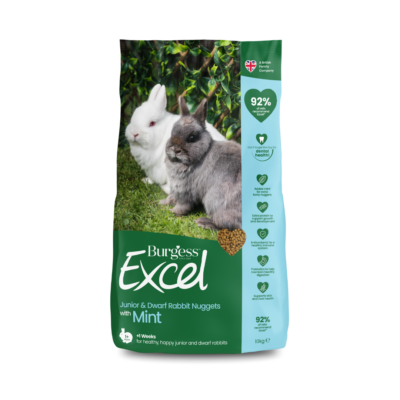
If you’ve got lots of questions about Holland Lop bunny food and wonder what Holland Lop bunnies eat to be healthy and happy, we’ve got lots of useful answers for you. Understanding what these fabulous animals, who have surprisingly delicate digestions, need to stay in the very best of health is a bunny lover essential.
What can I feed my Holland Lop rabbits?
When it comes to getting in the know about rabbit food and bunny nutrition, a good place to start is by learning about what wild rabbits feed on – and why. In their natural habitat, bunnies forage in meadows, munching on weeds, grasses, wildflowers, and flower and vegetable plants.
These foods are naturally high in fibre, which keep their digestive system functioning properly, and also helps to wear down their continuously growing teeth. Our pet bunnies, who enjoy roaming our homes and gardens, benefit from eating a diet which is similar to that of their wild cousins.
With this in mind, when it comes to choosing the best food for a Holland Lop bunny, the ideal bunny diet should consist of rabbit-safe foods that are high in fibre for a healthy digestion, contain a carefully formulated balance of nutrients, and have no artificial colours or flavours.
Why rabbit muesli mixes are the WORST choice
When choosing Holland Lop rabbit food, steer clear of colourful muesli-style mixes – these are designed to appeal to humans rather than rabbits. While bunny owners may think they’re buying a nutritious blend of tasty nibbles, feeding a muesli mix to rabbits can result in all sorts of health problems. These include dental disease, obesity and even gut statis, a deadly condition in which a rabbit’s digestive system slows down or stops completely.
Burgess in-house vet, Dr Suzanne Moyes, explains why you should avoid muesli mixes: “When fed a muesli-style diet, rabbits will often selectively feed. Selective feeding is when rabbits pick out the high starch and sugary elements of their food and leave behind the high-fibre parts. This leads to rabbits eating an unbalanced diet which can result in poor health. That’s why we developed the UK’s first single component nugget for rabbits to prevent selective feeding and continue to use our expertise to produce the best foods for all rabbits.”
What’s the best 5-star rated food for Holland Lop rabbits? >>
HOLLAND LOP BUNNY PROFILE
Holland Lops are medium-sized rabbits, with an average weight of around 2.5kg (5.5lb). They have medium-length, dense fur that requires weekly or bi-weekly grooming. Their coat is either solid – one colour only – or broken up with patches of colours such as chestnut, black, chocolate, cream or fawn. Holland Lops can live up to 10 years.
Q: Why are rabbit nuggets the best choice for a Holland Lop?
A: Although rabbit nuggets should only make up 5% of a Holland Lop diet, they can play a vital role in making sure your buns get all the vitamins and minerals they need. Good quality rabbit nuggets are:
- High in beneficial fibre to keep your Holland Lop’s digestive system working correctly
- Contain vitamin A and vitamin C to support the immune system
- Contain vitamin D3, which has an important role in calcium absorption, vital to support bone and dental health
- Contain vitamin E, which has an antioxidant function that aids the body’s natural defences
- Formulated with minerals such as zinc for healthy skin and glossy coat, iron to support the blood, and copper for nerve function
- Made with tasty, natural ingredients, such as mint, to ensure your Holland Lop bunnies absolutely love their yummy nuggets!
Q: How much should I feed my Holland Lop rabbits?
A: When planning your Holland Lop bunny diet, their daily feeding plan should consist of a carefully balanced mix of rabbit food, feeding hay, nuggets and healthy treats:
- 85% – 90% unlimited grazed grass (not grass cuttings) or high quality rabbit feeding hay (not bedding hay, which may have poor nutritional value). As a guide, provide each rabbit with at least their own body size in feeding hay every day.
- A small handful of rabbit-safe leafy greens, vegetables and herbs.
- Pelleted Junior & Dwarf rabbit food – around one egg cup a day per rabbit. Rabbit nuggets help ensure your Holland Lops get all the vital vitamins and minerals they need.
- Constant access to fresh water – provide a bottle and a bowl of fresh water daily – lapping from a bowl is more natural to rabbits, but bowls may be knocked over, so a bottle is a good back-up.
- Some yummy, healthy rabbit treats can also be part of your Holland Lop feeding plan. These are great for training and hand feeding, helping you to build your bond with your bunny chums. What bun could resist a Forage & Feast hay bar topped with Cornflower, Marigold or Rose? Or how about some irresistible Nature Snacks such as Fruity Feasts with banana and blueberry, Herby Hearts with mixed herbs and apple, or Meadow Munchies with dandelion and chamomile!
DID YOU KNOW?
Highly active, lop-eared rabbits are energetic and playful, and love cat toys, which keep them entertained and happy. Despite their playful, energetic nature, Holland Lops thrive best in quiet, calm households with older children, as they can be quite skittish. Help to keep your Holland Lops calm and contended by feeding them with Burgess Excel Junior & Dwarf Nuggets with Mint. This high-quality recipe has been formulated by vets to ensure it contains the right balance of vitamins and minerals.
Fun games to play with your pet rabbits >>
Q: What vegetables and herbs can my Holland Lop rabbits eat?
A: A selection of rabbit-safe leafy greens – a handful per day, per bunny – will feature highly on your Holland Lops’ favourite food list, adding variety to a well-planned rabbit diet. Ideal vegetables and herbs include:
- Broccoli
- Fennel
- Parsley
- Coriander
- Rocket
- Carrot tops
- Cauliflower leaves
- Mange tout
- Kale
- Mint
- Romaine lettuce
- Leaves from dandelions, hazel, willow or apple trees
Rabbits don’t naturally eat root vegetables, so carrots are generally best avoided. Rabbit Welfare, a charitable organisation that works to ensure all pet rabbits in the UK are cared for with understanding, insight and kindness, has a comprehensive list of recommended vegetables and herbs.
DID YOU KNOW?
The way you feed your Holland Lop rabbits is also important as buns love to snuffle around for titbits. So, rather than putting their nuggets in a bowl, place them around their enclosure, in their tunnels, in paper bags, cardboard loo rolls or under some hay, to encourage their natural urge to go foraging.
Mix and match different hay varieties to keep things interesting, such as British Meadow Feeding Hay, top qualityTimothy Hay for rabbits (which both come in a recyclable cardboard box that your buns could have a great game in!), delicious Hay with Dandelion and Marigold and ultra-chewable Long Stem Feeding Hay.
Add to the foraging fun by mixing in some Luscious Leaves – containing dandelion leaves, nettle leaves, red clover and ribwort – or Wildflower Forage – made with a delectable blend of rose, hibiscus, marigold and cornflower.
Help your bunnies stay in great shape with these exercises for rabbits >>
Q: What fruits can my Holland Lop rabbits eat?
A: While rabbits can enjoy some fruit as part of their diet, only give them a little bit such as a couple of strawberries or a slice of apple occasionally. This is because rabbits don’t naturally eat fruit, which is generally high in sugar, and eating too much can lead to tubby bunnies.
Safe fruits that can be included in your Holland Lops' diet‘ include:
- Apples – not the pips, they’re poisonous
- Bananas
- Kiwi fruit
- Melon
- Pears
- Plums
- Strawberries
Q: What should I not feed my Holland Lop rabbits?
A: There are a several items that are classed as unsafe food for rabbits and therefore should be avoided altogether. These include:
- Rabbit muesli – Two years of research at the Royal (Dick) School of Veterinary Studies, Edinburgh, linked muesli style foods to life-threatening dental and digestive problems in rabbits.
- Sweet treats – Some treats that are marketed as rabbit food – such as milk-based yoghurt drops or sticks of sweetened cereals – can contribute to obesity and tooth decay.
- Lettuce – Some types of lettuce, such as iceberg, contain lactucarium, which can be harmful to rabbits in large quantities. Light-coloured lettuce varieties are high in water, have very little nutritional value and will just give your rabbits the runs.
- Avocado – It’s very fatty and should never be included in your rabbits’ diet.
- Chard – It’s a leafy green but not one that rabbits can tolerate, causing colic and bloating.
- Grass cuttings – Rabbits should be given unlimited access to steadily graze on fresh grass, just as they would in the wild, but a pile of grass cuttings can be very harmful to them.
- Rhubarb – This common garden plant can be poisonous to animals if eaten raw.
- Bread, pasta and crackers – High-carb foods can cause series stomach issues.
- Nuts – All nuts are high in fat, not fibre, and will give your rabbits extremely uncomfortable indigestion.
If you’re not sure whether something’s safe for your rabbits to eat, it’s best avoided.
Q: Why should I choose Burgess Excel rabbit food for my Holland Lop rabbits and how do I switch foods safely?
A: The Burgess Excel rabbit range is made at our own factory in Yorkshire, using only the best ingredients and UK-grown grass. Plus, it’s easy to order online, with free delivery over £25.
View our range of hay, nuggets and healthy treats that your buns will love >>
With a whole host of *5 STAR REVIEWS*, our customers have told us:
* “Rabbits love this food. Been using it for 2.5 years. They don’t want to eat anything else.” * “I Bought this product for my new baby pet rabbit; she absolutely loves it as I can tell from how much she eats all her portion over time. I bought it as it is good for their coat, immune system, teeth, natural growth etc.” * “Rabbits love their food – that's good enough for me!” * “This is the only food my rabbit will eat, he’s an old boy now. l know Burgess food is a good quality.” * “Quality food, our rabbits love their mint nuggets.” “My rabbits love this food. Tried others but this is the best.” *
Because a rabbit’s digestive system is so delicate, moving them from one food to another has to be done very carefully, requiring a transition period of 14-28 days.
- In the first few days, measure out your rabbits’ normal nugget intake for the day. Take out a small amount of old rabbit nuggets, and replace with the same, small amount of new. Give the bowl a mix around to make sure your rabbits will eat a combination of the two.
- Each day, slightly reduce their old food, and replace it with slightly more of their new food. Patience is key here. Changing your rabbits’ food too quickly can cause digestive issues, which can lead to serious health problems.
- Keep replacing your rabbits’ old food with their new food until their food has been completely replaced. At the end of the transition period, your rabbits should be eating their new rabbit nuggets happily with no issues!
NEED MORE ADVICE? If you’re at all unsure about the best way of feeding your rabbits or have any concerns about specific nutritional requirements, ask your local veterinary practice for advice. You can also call our expert team, available 9am-5pm, Monday to Friday, on +44 (0)1405 862241 who’ll be happy to help. Alternatively, use our online contact form to get in touch.
Are your bunnies Burgess bunnies? Join the Burgess Pet Club for exclusive offers and rewards.
You can also sign up to the Excel Bunny Base – a safe Facebook community for rabbit guardians that are looking for advice and friendly discussions from likeminded owners – and there are lots of cute bunny photos and videos! Also follow us on Instagram.
CARE MORE Find lots of useful advice on caring for all your pets from Burgess, the pet experts with our Rabbit Health Guide >>
If you found this interesting, you may also like:
SPRING DAYS IN THE SUNSHINE As the days get longer, temperatures creep up and spring flowers open their colourful petals, our pets will be eager to get outdoors and enjoy the spring sunshine. However, if you’re thinking of moving your small pets – such as rabbits and guinea pigs – back outside if they’ve spent the winter indoors, what are the important things to know?
THE DOS AND DON’TS OF GARDENING IF YOU HAVE PETS Can you have a nice garden if you have pets? Well, Monty Don of BBC Gardeners’ World is living proof that you can! While we might not all have a Longmeadow out the back, with a little horticultural know-how, our gardens can be both pretty and pet safe.
LITTER TRAINING YOUR RABBITS Whether your buns live indoors or out, litter training has lots of benefits – both for them and you!
RABBITS AND NEUTERING Why this is important for healthy, happy bunnies, plus your neutering FAQs answered.
WHY DOES MY RABBIT...? If you’re a bunny lover, you’ll probably have many rabbit-related questions you’d like some answers to. For example, why does my rabbit bite me? Why does my rabbit thump? Why does my rabbit nose-nudge me? Why does my rabbit chuck stuff about? Read on to discover a whole warren full of fascinating answers...
HOW DO YOUR RABBITS FEEL ABOUT BEING HANDLED? Do your rabbits like being picked up? Being handled from a young age is essential for buns – otherwise they may find it a very stressful experience. Learning how to handle your rabbits in the right way is super important so that your bunny buddies feel comfortable and safe.
WHICH POPULAR RABBIT BREEDS HAVE THE MOST HEALTH ISSUES? ‘Cute’ bunny breeds such as the Lionhead rabbit, the Netherland Dwarf rabbit and the Mini Lop, are at risk from long-term health problems.
BONDING WITH YOUR BUNNY CHUMS It’s no surprise that rabbits who bond with their owners live longer and happier lives. Whether your buns are already part of the family, or you’ve just welcomed some new rabbits into your family, find out how to deepen your connection.
FINDING A VET FOR YOUR SMALL PETS If you have small pets, it can be a good idea to seek out a vet that specialises in small animal medicine. Plus, how often should you take your small pets to the vet? And how can make it a less stressful experience for them?
HOW TO RABBIT-PROOF YOUR GARDEN Rabbits love to run and roam about your garden, but a determined bunny with digging on their mind can quickly make their escape. Keep them safe with our top tips.
REGULAR CHECKS FOR YOUR BUNNIES As well as ensuring their pets have essential vaccinations, owners play a huge role in keeping their rabbits happy and healthy. Keeping a close eye on your buns is the best way to ensure all is well.
BUNNY TALK Learning to speak rabbit means that you’ll gain a fantastic insight into your rabbits’ world and be better equipped to provide them with a more fulfilling life as you begin to understand what makes them happy, stressed or cross.
HOW TO BE A GOLD-STAR INDOOR BUNNY OWNER Indoor rabbits make fabulous house pets, as long as you provide these smart and sociable animals with everything they need.
PROTECT YOUR PET’S HEALTH Show how much you love your pets by protecting their health during the cost-of-living crisis.
PET INSURANCE EXPLAINED Cat insurance, dog insurance, rabbit insurance – what pets can get cover? Can you get pet insurance for pre-existing conditions? Can you get pet insurance for older pets? Can you get multi-pet cover? We answer some of the most commonly asked questions to help you make an informed decision about pet insurance.
COULD YOU ADOPT A RABBIT? Urgent appeal: rescued bunnies are in desperate need of homes.
COST EFFECTIVE WAYS TO LOOK AFTER YOUR SMALL PETS You may not have a big budget, but as long as you’ve got a little imagination and a bit of know-how, you can do marvellous things with loo rolls, an old fleecy scarf and some cardboard packaging.
ARE YOU READY FOR RABBITS? If you’re thinking of adding some fluffy nose twitchers to your life, make sure you know what you’re taking on. Rabbits have a reputation for being ideal pets for children, but in fact, they need a great deal of looking after.
VACCINATIONS – VITAL FOR US AND OUR PETS Find out how vaccinations work, what dog vaccinations, cat vaccinations, rabbit vaccinations and ferret vaccinations protect against, when your pets should be vaccinated and lots more essential information...
HOW TO PROTECT YOUR GUINEAS AND BUNNIES FROM PESKY PARASITES When it comes to protecting our small pets from mites, fleas, flies, ticks and mosquitoes – and any other irritating and unwelcome pests – a four-pronged attack is the best approach.
















